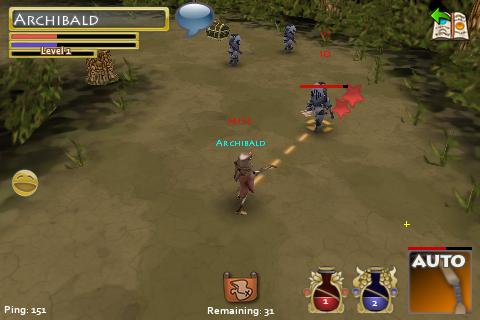 A couple of weeks ago at GDC 2011 in San Francisco Cinco Barnes from Spacetime Studios talked about their experience with Pocket Legends on iOS and Android devices (the complete summary of the session is here) . As you might know, it is working out quite well for them, not just on iOS, especially expanding into Android territory gave revenues a huge boost. Surely a key factor of this success is delivering a quality product in a niche (it won’t be a niche much longer but while competition is getting tough on iOS, there is still a bit more room on Android) and getting the gameplay right for the audience.
A couple of weeks ago at GDC 2011 in San Francisco Cinco Barnes from Spacetime Studios talked about their experience with Pocket Legends on iOS and Android devices (the complete summary of the session is here) . As you might know, it is working out quite well for them, not just on iOS, especially expanding into Android territory gave revenues a huge boost. Surely a key factor of this success is delivering a quality product in a niche (it won’t be a niche much longer but while competition is getting tough on iOS, there is still a bit more room on Android) and getting the gameplay right for the audience.
In the Spacetime Studios case, some assumptions about how MMO’s should work on mobile platforms were spot on, some others were surprisingly wrong. I thought I would share the most notable.
Barnes told the audience that the studio decided to keep the focus on what’s the core of an MMO and what can be done on mobile platforms. Functionality and stability at launch are more important than breadth of content and game systems. The product was supposed to evolve over time. Features were engineered to be flexible and dynamic. So the plan was to create a game for the casual RPG audience, have simple game systems and encounters, often with an obvious and easy path to success. After all the mobile gaming audience wants instant access to relevant content and short meaningful play sessions, right?
It turns out that the studio was right at aiming at the casual RPG audience. A lot of players picked up the game and liked it. However, this casual RPG audience soon cried for tougher challenges in the game. And while they indeed liked the instant access to the action in the game it became obvious that many of them also played the game for several hours straight. Suddenly the developers saw themselves confronted with players asking for deeper and more immersive content.
Something Spacetime Studios defintely want to do differently in the future is the way they approach balancing the game. Pocket Legends’ PvE gameplay got balanced before PvP – under the assumption that PvE is more important to casual gamers than PvP it sounds logical but according to Barnes this was a huge mistake. Balanced PvP is critical and now has priority over balancing PvE content. Experience tells us that from a player’s perspective imbalanced PvP is considered unfair and frustrating while imbalanced PvE – to a certain degree – is a tough challenge and it can even be rewarding to beat the AI as the underdog.
Another thing the devs underestimated in the first place was the players’ wish for customisation and uniqueness. Initially all players of the same class also had the same avatar. This was way too restrictive and since then efforts have been made to deliver more customisation options. In fact, the plan is to push uniqueness as far as the devices can handle it – it’s that important.
The team is also focused on creating a more immersive experience. While players liked the instant action when they only had limited time available a significant number of them asked for a more traditional MMORPG-like world experience for their longer sessions. Thus in addition to instant travel options and instanced zones it is now also possible to walk from town to town, contiguous zones have been added and players can now go questing as well as encounter boss battles and rare spawns.
The plan is, to learn from these lessons and use all this for the next game: Blackstar! Adding all the points above up it’s fair to say that mobile gaming is not exclusively ‘mobile’. The ability to play a game while waiting for a train is an added feature but players who love the game will also pick it up at home and keep playing for hours. And when they do that, they tend to miss features traditional non mobile games are offering. It would most likely not be a good idea to publish a game on a mobile device where players are forced to walk 10 minutes to even start their first quest (nor would it be for any MMO) but Spacetime Studios learned that by only developing with the short session aspect in mind, the audience quickly reaches a point where they consider the game not deep and immersive enough. Finding the right balance between instant action for shorter sessions and complex content for whole evenings on the couch is the key to keeping players engaged wherever they are.
These insights seem to corroborate the existence of an underserved niche for hardcore mobile gamers., as recently suggested by EA in a NPD/EA study. 47% of mobile gamers actually play from home, and only 12% play on their commute. Although it seems that people playing for long durations are still a minority (according to arecent study by PopCap, only 37% of smartphone users play more than 1 hour per week, and only 18% play more than 2 hours per week), this niche seems to be growing and asking for tailored experiences (as the recent succes of Epic’s Infinity Blade can also testify). The challenge going forward will be to propose the depth of content these gamers are increasingly expecting with the need for easy access and technical constraints that mobile games are subject to.
Now I got to say that I am looking forward to seeing more of Blackstar. It will be interesting to see how they build the bridge between mobile and ‘couch potato’ gaming. My devices are set to stun!

Leave a Reply
Want to join the discussion?Feel free to contribute!